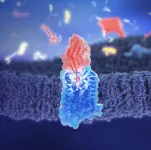(Press-News.org) The secret to losing weight could all be down to a combination of 14 ‘skinny genes’, a new study has found.
University of Essex researchers discovered they helped people drop twice as much weight when they ran for half an hour three times a week.
The team - led by Dr Henry Chung, from the School of Sport, Rehabilitation and Exercise Sciences - found those with more of the genes slimmed the most across eight weeks.
People with the most markers lost up to 5kg during the study and people without them dropped an average of 2kg.
The study found the PARGC1A gene that encodes PGC-1-a was key to weight loss and present in the participants who lost the most weight.
With the research showing that 62 per cent of the dropped kilograms were linked to the gene and 37 per cent linked to exercise and lifestyle factors.
Despite the results, Dr Chung said lifestyle factors and diet are still vital for slimming down.
Dr Chung said: “This study highlighted some important genes associated with taking inches off the jeans, but it’s important to remember that the genes will do nothing without exercise and lifestyle changes as they are all interlinked.
“Without intervention, they won’t show their true potential and then it doesn’t matter what genes you have!
“Away from weight loss exercise has so many benefits – ranging from mental health to cardiovascular fitness – so I’d advise everyone to keep on training even if they aren’t seeing the difference on the scales.”
The study followed 38 people all aged between 20 and 40 years old.
They were instructed to follow their normal diets and lifestyle habits, not do any other training, and were weighed before and after the study.
The paper, published in Research Quarterly for Exercise and Sport, builds on Dr Chung’s previous study which showed running performance was also linked to genetics.
He hopes the research will allow governments, companies, and individuals to better tailor health interventions.
“If we can better understand someone’s specific genetic profile, hopefully, this will translate to better and more successful interventions for improving health outcomes” added Dr Chung.
END
The secret to slimming? Special ‘skinny genes’ double weight loss
2024-10-09
ELSE PRESS RELEASES FROM THIS DATE:
Study finds persistent infection could explain long COVID in some people
2024-10-09
EMBARGOED UNTIL OCTOBER 9, 2024 AT 6:30 AM ET
Brigham researchers found people with wide-ranging long COVID symptoms were twice as likely to have SARS-CoV-2 proteins in their blood, compared to those without long COVID symptoms
A persistent infection could explain why some people experience long COVID symptoms, according to a new study led by researchers at Brigham and Women’s Hospital, a founding member of the Mass General Brigham healthcare system. The team found evidence of persistent infection in 43 percent of participants with cardiopulmonary, ...
COVID-19 infection appeared to increase risk of heart attack & stroke up to 3 years later
2024-10-09
Research Highlights:
An analysis of UK Biobank health data that included adults who had mild to severe COVID-19 before vaccines were available found an increased risk of heart attack, stroke and death among those adults during the nearly three-year follow-up period after COVID infection.
The elevated risk of heart attack, stroke and death linked to COVID-19 infection was found to be comparable to cardiovascular risk factors such as Type 2 diabetes, peripheral artery disease and cardiovascular disease.
The study found that having a non-O blood type (A, B, AB) was associated with an increased risk of heart attack and stroke among ...
History of COVID-19 doubles long-term risk of heart attack, stroke and death
2024-10-09
Wednesday, October 9, 2024, Cleveland: A history of COVID-19 can double the risk of heart attack, stroke or death according to new research led by Cleveland Clinic and the University of Southern California.
The study found that people with any type of COVID-19 infection were twice as likely to have a major cardiac event, such as heart attack, stroke or even death, for up to three years after diagnosis. The risk was significantly higher for patients hospitalized for COVID-19 and more of a determinant than a previous history of heart disease.
Further genetic analysis ...
Tiny antibodies to fight the dangerous effects of opioids
2024-10-09
Opioid drugs are highly effective at relieving pain but come with severe drawbacks. Their side effects range from dizziness to potentially fatal respiratory depression. Their illegal use contributes to nearly half a million deaths worldwide each year. Researchers from the University of Geneva (UNIGE) have discovered a molecule, called nanobody NbE, which binds tightly and durably to the cell receptors that usually bind to opioids, thereby blocking the drugs’ activity. Moreover, the scientists were able to create even smaller molecules that retain the same properties, which could prove far more effective than current treatments in ...
Researchers discover how plants produce a novel anti-stress molecule
2024-10-09
New research identifies for the first time the genes that help plants grow under stressful conditions - with implications for producing more sustainable food crops in the face of global climate change.
Led by the University of East Anglia (UEA), the study reveals the genes that enable plants to make a novel anti-stress molecule called dimethylsulfoniopropionate, or DMSP. It shows that most plants make DMSP, but that high-level DMSP production allows plants to grow at the coast, for example in salty conditions.
The research also shows that plants can be grown under other ...
You get your energy from your mom. A new study explains why
2024-10-09
It’s one of the basic tenets of biology: We get our DNA from our mom and our dad.
But one notable exception has perplexed scientists for decades: Most animals, including humans, inherit the DNA inside their mitochondria —the cell’s energy centers – from their mothers alone, with all traces of their father’s mitochondrial genome destroyed the moment sperm joins egg.
A new University of Colorado Boulder study published Oct. 4 in the journal Science Advances sheds new light on why this happens, showing that when the process fails, and paternal mitochondria slips into a developing embryo, it can lead to lasting neurological, behavioral and reproductive ...
Our food system is broken and we only have 60 harvests left, researchers warn
2024-10-09
Plant-based diets, compassionate agriculture, Indigenous methods, consumer pressure, new laws, international agreements and even vegan pets – these are the solutions for fixing our broken food and farming systems, say dozens of environmental advocates, researchers, farmers and industry pioneers in a new book.
Editors Joyce D’Silva and Carol McKenna sound the alarm in their introduction to Regenerative Farming and Sustainable Diets, warning that ‘our food system is broken’. Radical change is needed, they say, in our world where one‑third of food is lost or wasted, 780 million people ...
Viruses are teeming on your toothbrush, showerhead
2024-10-09
Step aside tropical rainforests and coral reefs — the latest hotspot to offer awe-inspiring biodiversity lies no further than your bathroom.
In a new Northwestern University-led study, microbiologists found that showerheads and toothbrushes are teeming with an extremely diverse collection of viruses — most of which have never been seen before.
Although this might sound ominous, the good news is these viruses don’t target people. They target bacteria.
The microorganisms collected in the study are bacteriophage, or “phage,” a type of virus that infects and replicates inside of bacteria. Although researchers know little about them, phage recently ...
Can weight-loss surgery help prevent pancreatic cancer in people with obesity?
2024-10-09
Obesity and type 2 diabetes are risk factors for various malignancies, including pancreatic cancer, which has a high death rate. A new analysis in Diabetes/Metabolism Research and Reviews suggests that weight-loss surgery—also called metabolic-bariatric surgery—may lower the risk of developing pancreatic cancer in people with obesity, especially in those who also have type 2 diabetes.
In the systematic review and meta-analysis, investigators identified 12 relevant studies that explored the effects of metabolic-bariatric surgery on pancreatic cancer incidence, with a total of 3,711,243 adults ...
Octopus-inspired adhesive works well in wet conditions
2024-10-09
In research published in Advanced Science, investigators drew inspiration from the octopus to develop an adhesive that achieves strong attachment and controlled release on varied substrates in wet and underwater environments. The feat could have numerous applications in fields ranging from healthcare and underwater robotics to infrastructure repair.
By studying the octopus’s suckers—specifically, the exposed disc-like portion called the infundibulum—the researchers designed an elastic, curved stalk with a membrane that can change its shape ...


